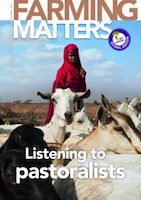Common Ground: Securing Land Rights and Safeguarding the Earth
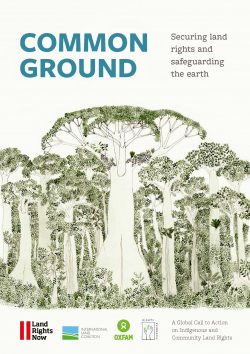
Although protecting half the world’s land, indigenous people and local communities formally own only 20 %, with the remainder being vulnerable to land grabs. This report has been published alongside a call to action by the International Land Coalition (ILC), Oxfam, and the Rights and Resources Initiative (RRI), together with more than 300 organisations and communities all over the world. They aim to double the amount of community owned land by 2020.The report explains why protecting community lands is so important. Pastoralist communities have long been considered the cause of desertification but actually play an essential role in combating climate change and providing food security. Recognising their role as pillars of environmental adaptation is one of the core messages of this report.
Youth: The future of reindeer herding peoples
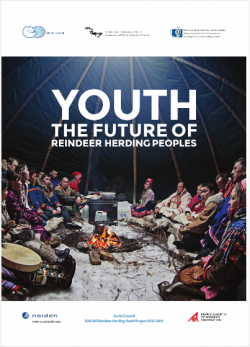
This report was presented in April 2015 to the Arctic Council Ministerial Meeting in Canada. It is the result of more than four years of community based workshops where more than 160 young reindeer herders from Russia, Mongolia, Finland, Sweden and Norway confronted each other in the context of the EALLIN project. EALLIN means ‘life’ in the Sami language, because, “for us, the reindeer is everything. If we lose the reindeer we lose our language, our culture, our traditions and the knowledge to move in the nature.” Issues such as health, loss of cultural heritage, technology access, lack of education, land access and predators are brought up in the report, reflecting the most urgent struggles that young herders in the circumpolar area are facing, and that need to be tackled if their lifestyle and cultural heritage are to be protected.
The Governance of Rangelands: Collective Action for Sustainable Pastoralism
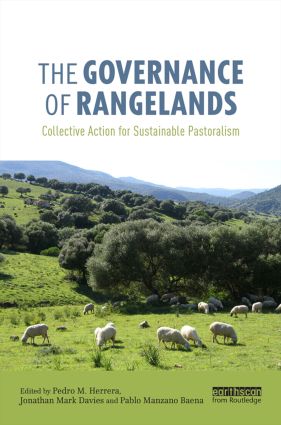
https://www.book2look.com/embed/9781317665168
Grasslands, shrublands, savannahs, and woodlands: these are rangelands, often communally managed by the pastoralist communities inhabiting and crossing them. Despite evidence of the beneficial effects of livestock mobility and communal governance in these areas, often governmental policies are eroding the autonomy of these grassroots systems. So how can pastoral communities adapt their traditional institutions to a constantly changing environment, taking advantage of the latest innovations? How can lost or degraded institutions be recovered? Can new institutions be created from scratch where lacking? These are the main questions explored in this publication, through a variety of success stories in pastoralist governance. The eleven case studies from the Middle East, Africa, Asia and America set an example based in cooperation, providing resources for the improvement of pastoralist governance: from legal steps, such as securing the rights of pastoralist communities on their territories, to participatory systems, that strengthen the voice and visibility of the communities.
The path to greener pastures. Pastoralism, the backbone of the world’s dryands
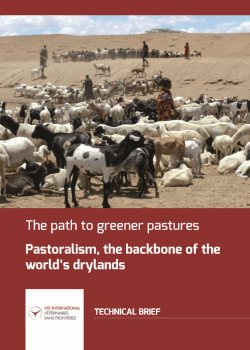
Vétérinaires Sans Frontières International supports small scale farmers through projects focused on livestock production, animal health and welfare. This report provides practical recommendations for policy makers and institutions to deal with the struggles of pastoralist communities. The publication presents an extensive account of the current state of pastoralism, with surveys of members and leaders of pastoralist communities in eight hotspots around the world, and various informants in 26 countries in Africa, Latin America, and Asia. The economic, human, cultural, social and political capital of pastoralist communities is recognised here, as their relevance in biodiversity conservation, food safety, income and employment generation in drylands and marginal areas becomes clear. The recommendations elaborated call on policy makers, asking them to recognise the value of pastoral communities promoting their involvement in the management of water resources, reforestation programmes, and climate change adaptation. A new approach is suggested, that draws on ‘community capital’ to promote its growth.
More on pastoralisme
UNEP (United Nations Environment Programme) and IUCN (International Union for Conservation of Nature) have neatly summarised the discussion around pastoralism in the context of the post 2015 agenda. A list of overlooked facts, myths, and emerging issues leads to the recommendations for strengthening sustainable pastoralism, ranging from improved access to technologies,to the promotion of consumer awareness. Some relevant issues for pastoralism are also touched upon in the recent report by the High Level Panel of Experts on Food Security and Nutrition on the roles for livestock.
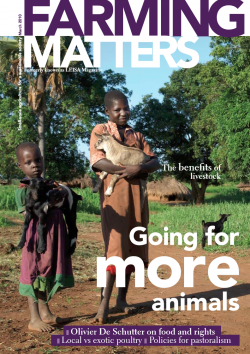
Taking a look back, in 2010 ILEIA published an issue of Farming Matters titled, ‘Going for more animals’. The discussion around strengthening pastoralism and the need for better policies was already relevant and the magazine also offers successful examples of nomadic livestock management.

